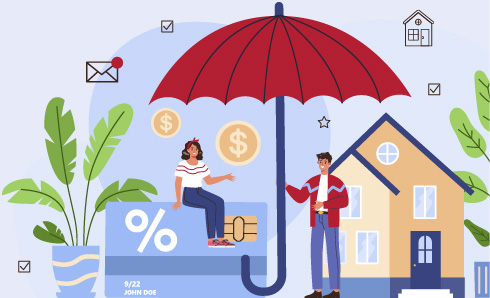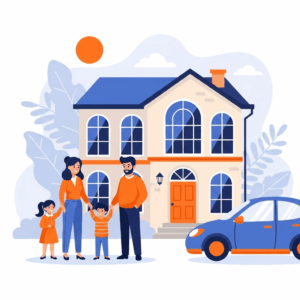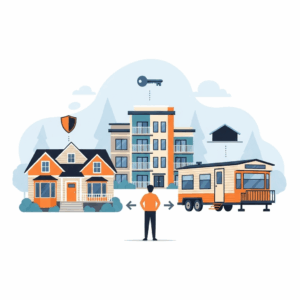Home Insurance
Save 20% when you bundle home & auto

Buying your first home feels incredible until reality hits – now you need to protect the biggest investment you’ll probably ever make. We get it. The excitement of holding those keys can quickly turn into anxiety about insurance requirements, coverage options, and finding the right protection. At Magnum Insurance, we’ve helped thousands of homeowners navigate this exact situation, turning insurance confusion into confidence.
What Makes Home Insurance Essential?
Your home is more than just four walls and a roof – it’s your sanctuary, your financial foundation, and your family’s security. Home insurance creates a protective barrier between you and the unexpected disasters that could devastate your finances overnight.
Think of home insurance as your financial safety net. When storms damage your roof, thieves break in, or someone gets injured on your property, your policy steps in to handle the costs. Without it, you’re personally responsible for every dollar of damage, replacement, and legal liability.
Most mortgage lenders require home insurance before approving your loan. They’re protecting their investment, but more importantly, you’re protecting yours. Even if you own your home outright, home insurance remains one of the smartest financial decisions you can make.
Understanding Your Home Insurance Coverage Options
Modern home insurance policies offer multiple layers of protection, each designed to shield you from different types of financial loss. Our comprehensive coverage addresses the real-world risks homeowners face daily.
Dwelling Protection Your home’s structure – walls, roof, floors, and built-in systems – receives protection against covered perils. This includes fire damage, wind destruction, hail impact, and sudden accidents like burst pipes. The coverage rebuilds or repairs your home to its pre-loss condition, ensuring you don’t lose your investment to unexpected disasters.
Personal Property Coverage Everything inside your home deserves protection too. Your furniture, electronics, clothing, and personal belongings receive coverage when damaged, destroyed, or stolen. Whether it’s a kitchen fire that ruins your appliances or a break-in that costs you electronics, this coverage replaces what you’ve lost.
Liability Protection Accidents happen on your property, and when they do, you could face expensive lawsuits. If someone slips on your icy walkway or your dog bites a neighbor, liability coverage handles the medical bills and legal costs. This protection extends beyond your property line – it even covers incidents involving your family members away from home.
Additional Living Expenses When covered damage makes your home unlivable, you still need somewhere to stay. This coverage pays for hotel bills, restaurant meals, and other extra costs while your home undergoes repairs. It keeps your life stable during an already stressful time.
When Do You Need Home Insurance?
The moment you become a homeowner, you need protection. Most people discover this during the mortgage process – lenders require proof of coverage before closing. But the need extends far beyond loan requirements.
Mortgage Requirements Every legitimate lender demands home insurance before funding your mortgage. They want assurance that their investment stays protected against major losses. The requirement typically continues until you pay off the loan completely. Understanding the home buying process helps you prepare for this requirement early.
Investment Protection Even without a mortgage, home insurance makes financial sense. Your home is most likely your largest asset – losing it to fire, storm damage, or other disasters could destroy your family’s financial future. Smart homeowners protect their investment regardless of loan requirements.
Legal Liability Property ownership creates legal responsibility for injuries and damages occurring on your land. Without insurance, a single serious accident could result in lawsuits that drain your savings and future earnings. Protection against these risks justifies the cost many times over.
Types of Home Insurance Policies
Insurance companies offer different policy types, each providing specific levels of protection. Understanding these options helps you choose coverage that matches your needs and budget.
HO-3 Comprehensive Coverage Most homeowners choose HO-3 policies because they provide broad protection for both dwelling and personal property. These policies cover all perils except those specifically excluded, giving you maximum protection for your investment. When comparing options for comprehensive commercial property insurance, businesses often seek similar broad-form protection.
HO-1 Basic Coverage Budget-conscious homeowners sometimes select HO-1 policies that cover only specific named perils like fire, lightning, and theft. While cheaper, these policies leave gaps in protection that could prove costly during claims.
HO-5 Premium Protection High-value homes often require HO-5 policies that provide the most comprehensive coverage available. Both dwelling and personal property receive open-perils protection, covering everything except specifically excluded events.
Home Insurance Cost Factors
Understanding what drives your premiums helps you make informed decisions about coverage and find ways to reduce costs without sacrificing protection.
Location Impact Where you live dramatically affects your rates. Homes in hurricane zones, earthquake regions, or high-crime areas face higher premiums due to increased risk. Weather patterns, local building codes, and proximity to fire departments all influence pricing.
Home Characteristics Your home’s age, construction materials, and overall condition directly impact costs. Newer homes with modern electrical, plumbing, and roofing systems typically qualify for lower rates. Older homes or those with higher-risk features like wood shake roofs face higher premiums.
Coverage Limits Higher coverage limits mean higher premiums, but they also provide better protection. Choosing adequate limits prevents you from paying out-of-pocket during claims. Underinsuring saves money upfront but creates expensive problems later.
Deductible Selection Higher deductibles reduce your premiums but increase your out-of-pocket costs during claims. Finding the right balance depends on your financial situation and risk tolerance. Most homeowners benefit from deductibles between $500 and $2,500.
Getting Your Home Insurance Quote
Shopping for home insurance requires preparation and understanding of what information insurers need to provide accurate pricing.
Information Gathering Before requesting quotes, collect details about your home’s age, square footage, construction materials, and recent updates. Having renovation receipts, maintenance records, and photos helps insurers assess your risk accurately. The more information you provide, the more precise your quote becomes.
Comparison Shopping Different home insurance company options offer varying rates for identical coverage. We recommend comparing at least three quotes to ensure you’re getting competitive pricing. However, don’t let price be your only consideration – claims service and financial stability matter tremendously when you need help most.
Coverage Customization Standard policies might not address your specific needs. If you own expensive jewelry, art, or collectibles, discuss additional coverage options. Home-based businesses, swimming pools, or unusual property features require special consideration during the quoting process.
Common Coverage Gaps and Solutions
Even comprehensive policies contain gaps that could leave you financially exposed. Understanding these limitations helps you address them before problems arise.
Flood Exclusions Standard home insurance doesn’t cover flood damage from external sources like rising rivers or storm surge. If you live in a flood-prone area, separate flood insurance provides essential protection. Even homes outside high-risk zones can benefit from flood coverage.
Earthquake Limitations Most policies exclude earthquake damage, leaving homeowners vulnerable in seismic regions. Earthquake insurance adds protection for this specific peril, though it typically comes with high deductibles.
Business Property If you run a business from home, your standard policy might not cover business equipment or liability. Business insurance provides specialized protection for home-based enterprises.
High-Value Items Standard policies limit coverage for expensive items like jewelry, art, or electronics. Scheduled personal property endorsements provide additional protection for these valuable possessions.
Claims Process and What to Expect
Understanding how claims work helps you prepare for the process and ensures you receive fair settlements when disasters strike.
Immediate Steps: After damage occurs, your first priority is safety – ensure everyone is secure before documenting losses. Take photos of damage, make temporary repairs to prevent further loss, and contact your insurance company immediately. Most insurers offer 24/7 claims reporting for urgent situations.
Documentation Requirements: Thorough documentation supports your claim and speeds settlement. Photograph damage from multiple angles, save receipts for emergency repairs, and create detailed lists of damaged or stolen items. Having a pre-loss home inventory makes this process much easier.
Adjuster Interaction: Insurance adjusters evaluate your damage and determine settlement amounts. Being present during inspections helps ensure nothing gets overlooked. Ask questions about coverage decisions and request explanations for any limitations or exclusions that affect your claim.
Settlement Timeline: Simple claims often settle within days, while complex losses involving structural damage can take weeks or months. Understanding the process and maintaining regular communication with your adjuster helps keep things moving smoothly.
Bundling Opportunities and Discounts
Combining home insurance with other policies often provides significant savings while simplifying your insurance management.
Multi-Policy Discounts: Bundling home and auto insurance typically saves 10-25% on both policies. The convenience of dealing with one agent and one company for multiple needs adds value beyond just cost savings.
Security Discounts: Installing security systems, smoke detectors, and other safety features can reduce your premiums. Many insurers offer discounts for monitored alarm systems, deadbolt locks, and fire extinguishers. These features protect your home while saving money on insurance.
Loyalty Benefits: Long-term customers often qualify for loyalty discounts that increase over time. Staying with the same insurer can provide both rate benefits and simplified claim processes through established relationships.
Condo vs. Home Insurance Considerations
Different property types require different insurance approaches. Understanding these distinctions helps you choose appropriate coverage for your specific situation.
Ownership Differences Condominium owners need different protection than single-family homeowners. Condo associations typically insure common areas and building exteriors, while unit owners insure their personal property and interior improvements. Learning about HO6 insurance vs HO3 helps condo owners understand their coverage needs.
Coverage Coordination Condo owners must coordinate their personal coverage with association master policies. Gaps between policies can leave you exposed to significant losses. Understanding both coverages ensures complete protection.
Specialized Coverage Needs
Some homeowners require additional protection beyond standard policies. Recognizing these needs helps you build comprehensive coverage that addresses all your risks.
Vacation Homes: Second homes face unique risks due to extended vacancy periods and remote locations. Specialized coverage addresses these challenges while providing protection for your investment property.
High-Value Homes: Luxury properties often exceed standard policy limits and require specialized coverage. High-value home insurance provides adequate limits and additional services like guaranteed replacement cost coverage.
Rental Properties If you rent out your home or rooms within it, standard homeowner’s insurance might not provide adequate protection. Landlord insurance addresses the unique risks of rental property ownership.
State-Specific Requirements and Considerations
Insurance requirements and regulations vary by state, affecting both coverage options and costs. Understanding local factors helps you make informed decisions.
Regional Perils Different regions face different risks. Coastal areas need hurricane protection, while mountain regions require consideration for wildfire and earthquake risks. Your location determines which perils require special attention.
Legal Requirements While homeowner’s insurance isn’t legally required like auto insurance in Illinois, mortgage lenders universally require coverage. Understanding local building codes and insurance regulations helps you meet all requirements.
Why Choose Magnum Insurance for Your Home Protection
We’ve built our reputation on providing exceptional service to homeowners who need reliable protection and expert guidance. Other companies might treat you as just another policy number – we see you as a neighbor who deserves personalized attention.
Our Home Insurance Advantages:
- Comprehensive coverage options tailored to your specific needs
- Competitive rates with multiple discount opportunities
- Local agents who understand regional risks and requirements
- Quick claims processing with dedicated support throughout
- Bundle discounts when you combine home and auto coverage
We know your home is more than just a building – it’s where your family creates memories and builds their future. That’s why we take protecting it as seriously as you do.
Questions About Coverage?
Home insurance can seem complex, but it doesn’t have to be overwhelming. Our experienced agents are ready to explain coverage options, answer questions, and help you find protection that fits your needs and budget. For comprehensive answers to common concerns, explore our detailed home insurance FAQs section.
Ready to Protect Your Home Today?
Don’t leave your most valuable asset unprotected. Every day you’re without adequate home insurance is another day you’re exposed to potentially devastating financial losses. Whether you’re buying your first home or reviewing existing coverage, we’re here to help you make the right decisions.
Contact Magnum Insurance now for your personalized home insurance quote. Our agents will assess your specific needs, explain your options, and help you find coverage that provides peace of mind without breaking your budget.
Call us at 1-888-539-2102 or visit one of our convenient locations to get started immediately. You can also reach out through our contact us page for additional assistance.
Your home protects your family – let us help you protect your home. With Magnum Insurance, you’re not just buying a policy; you’re investing in security, expertise, and peace of mind that lasts for years to come.
Home Insurance FAQs
Whether you’re just thinking of getting homeowners insurance or you already have one, it’s only natural to have a lot of questions about it.
Commonly Asked Questions About Home Insurance
In this article, we’ll briefly discuss the different types to give you an idea of which one best suits your needs.
There are eight types of homeowners insurance in the US, each one made for a specific purpose.
A Beginner’s Quick Guide to Buying a Home
Buying a home can be a big, intimidating step to undertake, especially if it’s your first time. After all, for most of us, our home is arguably one of the most valuable financial assets that we will have in our life. Nobody wants to make a mess of their first home – and their finances.
In this article, Magnum Insurance will help you demystify the home buying process. From before you even make an offer to after you complete the purchase, this short guide will tell you the basics of buying a home.
Three Stages of Buying a Home
See more on Beginner´s Quick Guide to Buying a Home
Related Links
Locations we serve
Magnum Insurance makes homeowners insurance easy
Get a free Home Insurance quote today
Is there a local Home Insurance agent near me?
Try our Location Finder to find the nearest agent near you.










